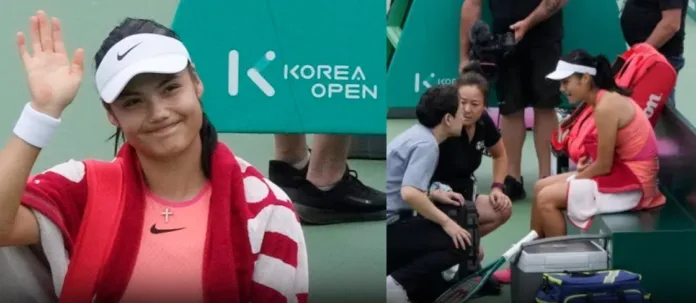The 21-year-old tennis star pulls out after struggling with a foot injury sustained during the Korean Open
Emma Raducanu has announced her withdrawal from the upcoming China Open in Beijing due to a foot injury. The 21-year-old British tennis star faced a setback after retiring from her quarter-final match at the Korea Open in Seoul on Saturday, where she experienced discomfort in her foot.
Raducanu’s name appeared in the draw for the Beijing event when it was released on Monday, but she quickly withdrew shortly afterwards. In a statement posted on X, she explained, “I sprained some ligaments in my foot which unfortunately need some more time to heal. It means I can’t play in Beijing, but I hope to be back competing as soon as I can.”
Ranked 54th in the world, Raducanu was set to face a qualifier in the first round, with a potential matchup against fifth-seeded Zheng Qinwen from China in the next round. In her recent match in Seoul, Raducanu took a medical timeout after just five games against Russia’s Daria Kasatkina. Despite her efforts, she ultimately decided to retire after losing the opening set.
Raducanu’s latest injury comes at a crucial time as she sits on the verge of breaking into the top 50 of the WTA rankings. The former US Open champion expressed optimism after her recent performance, noting that she had been “nursing a few niggles” in recent months but felt more confident in her physical condition. “I’ve been working hard—especially at the start of the year and the middle part of the year—physically,” she stated.
This season marks a significant comeback for Raducanu, who underwent surgery on both wrists and her left ankle last year. After returning to the circuit at the beginning of 2024, she has made steady progress, winning matches against higher-ranked opponents, including her recent victories over American Peyton Stearns and China’s Yue Yuan in Seoul. These wins have propelled her back toward the top 50 for the first time since August 2022 when the points from her historic US Open victory were removed from her ranking.
With 33 matches played on the WTA Tour this season, Raducanu is on track to match her participation levels from her busiest season in 2022. However, her withdrawal from Beijing represents another challenge as she aims to regain her footing in the competitive landscape of women’s tennis. The Korea Open marked her first tournament since a first-round exit at the US Open on August 28. Reflecting on her recent schedule, Raducanu described the experience as a “lesson to learn.”
Raducanu’s next scheduled appearance is at the Wuhan Open in China on October 7. As she recovers from her injury, her fans and the tennis community hope to see her return to form soon.
Analysis:
Political:
Raducanu’s withdrawal from the Beijing Open highlights the ongoing pressures athletes face within professional sports. As young athletes navigate intense competition and expectations, their health and well-being often become secondary to performance. This incident sheds light on the broader issue of how sports organizations manage athlete welfare and the importance of prioritizing health over immediate success. Discussions about the responsibilities of governing bodies to protect players from burnout and injuries are becoming increasingly relevant.
Social:
The incident underscores the societal fascination with young athletes and their journeys through adversity. Raducanu’s story resonates with many who admire her resilience and determination to overcome injuries. Her withdrawal, however, also reflects a growing awareness of the need for athletes to prioritize their health. Social media plays a crucial role in how fans perceive athletes’ struggles, allowing for greater connection and empathy. The public’s response to Raducanu’s injury may influence how young athletes approach their careers, recognizing the value of self-care in high-stress environments.
Racial:
As a British athlete of mixed heritage, Raducanu’s experiences contribute to conversations about diversity in sports. Her success has inspired many, especially within the British Asian community, and her challenges highlight the unique pressures faced by athletes from diverse backgrounds. The scrutiny and expectations placed on Raducanu can serve as a catalyst for discussions about representation in sports and the importance of supporting athletes from all racial and ethnic backgrounds in their journeys.
Gender:
Raducanu’s situation illustrates the additional scrutiny female athletes often face regarding their performance and health. Women in sports frequently deal with higher expectations to maintain flawless appearances and consistent performances. The challenges Raducanu faces, including injuries and scheduling conflicts, reflect the complex landscape female athletes navigate. Conversations about gender equity in sports are crucial, emphasizing the need for understanding and supporting female athletes’ unique challenges, especially in male-dominated environments.
Economic
Raducanu’s injury may have economic implications for her career and the sport of tennis as a whole. As a rising star, her marketability contributes to the sport’s appeal, attracting sponsors and fans. Her withdrawal from high-profile events like the Beijing Open could lead to lost sponsorship opportunities and diminished media attention. The economic impact extends beyond Raducanu; tournaments rely on star athletes to draw crowds and generate revenue. Ensuring that players are healthy and able to compete is vital for the sport’s financial health and its ability to engage audiences.
In summary, Emma Raducanu’s withdrawal from the Beijing Open serves as a pivotal moment that highlights various dimensions of her career, from the political pressures athletes face to the social dynamics that shape perceptions of female athletes. As she navigates her recovery, the tennis community remains hopeful for her swift return to the court.
